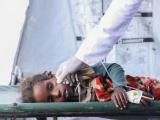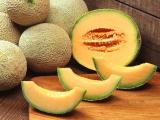Dec 1, 2005 (CIDRAP News) Close to 400 people in Ontario have gotten sick in a Salmonella outbreak blamed on contaminated mung bean sprouts, according to Canadian news reports.
Toronto's health department ordered Toronto Sun Wah Trading on Nov 25 to stop distributing mung bean sprouts because of possible contamination with Salmonella, the Ontario Ministry of Health and Long-Term Care announced the same day.
Dr. Sheela Basrur, Ontario's chief medical officer of health, said 379 cases of salmonellosis have been confirmed in the province, according to a CBC news report published today. The report said 26 of 36 regional health agencies in Ontario had reported cases linked with eating sprouts.
"We expect that there are many hundred more people who have Salmonella poisoning that have not yet come to our attention," Basrur was quoted as saying.
The outbreak began early in November, according to the provincial health ministry's Nov 25 news release. Normally about 20 to 25 cases of salmonellosis per month are reported at this time of year, the ministry said.
Referring to Sun Wah Trading, Basrur said in the news release, "We have linked this food processing plant to a number of illness[es] in this outbreak. While the investigation continues, as a precaution, we are advising the public to avoid eating bean sprouts."
The ministry statement did not spell out the evidence linking the cases with sprouts from Sun Wah Trading.
In a Nov 24 statement, the Canadian Food Inspection Agency (CFIA) said Sun Wah mung bean sprouts have been sold in packages of various weights and under various store names or without the Sun Wah name. Officials did not mention any distribution of the products outside Ontario.
Salmonella bacteria are found in the intestines of animals and can contaminate sprouts (and other raw fruits and vegetables) that have been in contact with impure water, animal manure, or an infected food handler, the ministry noted. Symptoms of infection usually begin from 12 to 36 hours after a person consumes a contaminated food.
The US Centers for Disease Control and Prevention reported in January 2002 that 15 salmonellosis outbreaks associated with consumption of raw sprouts had been reported in the United States since 1995. The recommended safety step of soaking seeds in a calcium hypochlorite solution is not completely effective, the agency said.
To reduce the risk of illness, the US Food and Drug Administration advises consumers to cook all sprouts thoroughly before eating them and to ask that raw sprouts not be added to restaurant sandwiches and salads.
Most cases of Salmonella infection resolve without medical treatment, but the pathogen can cause serious and sometimes fatal illness in children, elderly people, and those with weak immune systems.
See also:
Oct 2, 2002, CIDRAP News story "FDA cites mung bean sprouts in renewing warning against eating raw sprouts"
http://www.cidrap.umn.edu/cidrap/content/fs/food-disease/news/beansprout.html
















